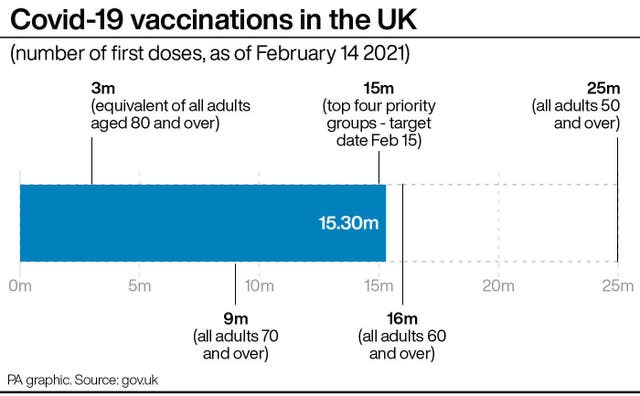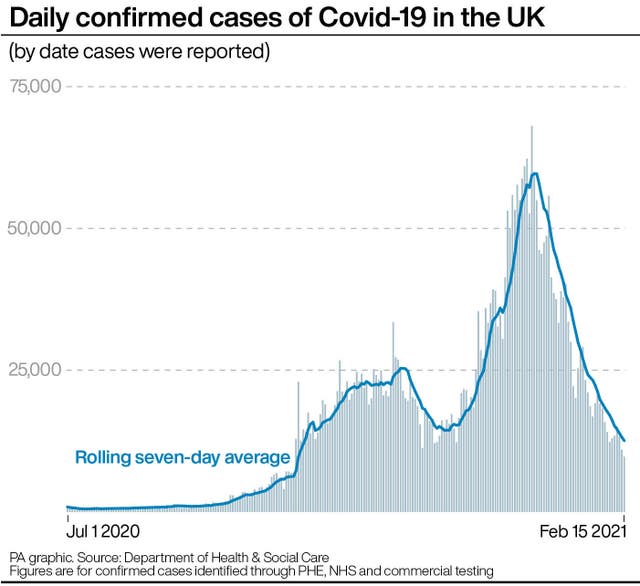Johnson pledges ‘irreversible’ approach to easing lockdown
The Prime Minister is preparing to set out his ‘road map’ for relaxing lockdown measures on February 22.

Boris Johnson has pledged a “cautious but irreversible” approach to easing the lockdown and said no decisions have been made on whether all pupils can return to school at the same time.
The Prime Minister stressed the need to be “very prudent” as ministers begin reviewing coronavirus restrictions in England, while lockdown-sceptical Tory MPs press for a swift reopening.
Mr Johnson is preparing to set out his “road map” for relaxing measures on February 22, with March 8 earmarked for schools to start reopening to all pupils.
He signalled a cautious approach by warning there is an increased chance of new and concerning variants emerging if infections remain high.
“When you have a large level of circulation, when you’ve got a lot of disease, invariably the vulnerable suffer, so that’s why we want to drive it right down, keep it right down,” he said during a visit to Orpington Health and Wellbeing Centre in south-east London.
Ministers have said reopening schools is their first priority, but reports have suggested a staggered approach may be taken, with secondary schools going back a week later than primaries.
“No decisions have been taken on that sort of detail yet, though clearly schools on March 8 has for a long time been a priority of the Government and of families up and down the country,” Mr Johnson told reporters.
He said: “We will do everything we can to make that happen,” but warned that infection rates are still “comparatively high” and Covid-19 patients in the NHS remain higher than the April peak.
“So we’ve got to be very prudent and what we wanted to see is progress that is cautious but irreversible, and I think that’s what the public and people up and down the country will want to see,” Mr Johnson added.

The Prime Minister’s official spokesman said the intention is to “start getting kids back to school from March 8”, but was not ruling out they could be sent back in stages.
Mr Johnson said he would aim to give target dates for restrictions being eased when he sets out his plan next Monday but “we won’t hesitate” to delay plans if infection rates make it necessary.
Professor Stephen Reicher, a scientist advising the Government’s Covid-19 response, warned that giving dates for lifting restrictions could be damaging if they are not met.
The member of the Scientific Pandemic Insights Group on Behaviours (SPI-B) told the PA news agency: “If things don’t happen on that date then people begin to be hopeless and helpless.
“You begin to have a sense of ‘look, there’s nothing we can do’ and that sense of helplessness is very damaging psychologically.
“I think it’s far more constructive to say to people ‘this is what we can do to get infections down’, to give people something active to do.”
His warning came after more than 15 million people across the UK received their first dose of a vaccine.
Ministers said they are “on track” to meet the target of getting an offer of a first dose to everyone in the UK in the top four priority groups – including all over-70s – by Monday.
Mr Johnson urged people entitled to a jab to accept them after Health Secretary Matt Hancock suggested around a third of social care staff have not received a vaccine, despite being one of the prioritised groups.
The Prime Minister’s spokesman said the Government favours encouraging care home staff to come forward and accept jabs rather than employers making them mandatory, echoing vaccine minister Nadhim Zahawi, who said such a move would be “discriminatory”.
In other developments:
– Government figures put the number of people to have received a vaccine at 15,300,151 – a rise of 237,962 on the previous day.
– A further 230 people had died within 28 days of testing positive for Covid-19 as of Monday, bringing the official UK total to 117,396.
– A Warwick University study suggested schools do not play a significant role in driving the spread of Covid-19 in the community.
– The first international travellers required to isolate for 10 days at Government-designated quarantine hotels arrived at Heathrow Airport on Monday morning.

The successful rollout of the vaccine programme is leading to increasing pressure from the Covid Recovery Group (CRG) of Conservative MPs to end restrictions quickly.
Over the weekend, more than 60 CRG members signed a letter calling for the Prime Minister to commit to a firm timetable ending with the lifting of all legal controls by the end of April.
But Mr Hancock told BBC Breakfast there is “some way to go” before lockdown is eased, stressing that the Government is awaiting key data on how successfully vaccines reduce transmission.
Mr Hancock cited “early evidence” showing vaccines reduce the spread of Covid-19 by about two-thirds, but stressed that ministers want to “see that actually in the data, not just from the trials”, as well as a drop in hospital admissions and deaths from jabs, when considering easing restrictions.
The Prime Minister confirmed on Sunday that the vaccine target had been met in England after First Minister Mark Drakeford announced on Friday that Wales had reached it.
The passing of the 15 million vaccinations mark paves the way for the next phase of the rollout, covering the next five priority groups, including the over-50s.
NHS England has already sent out 1.2 million invitations to the over-65s to book an appointment, with a similar number expected to go out this week.
The Government is aiming to get an offer of a vaccine to the estimated 17 million people in the next five groups by the end of April.





